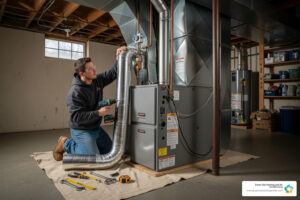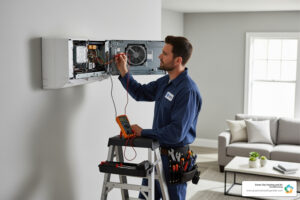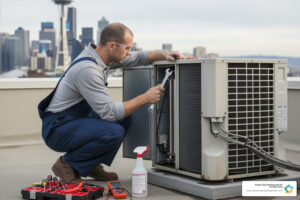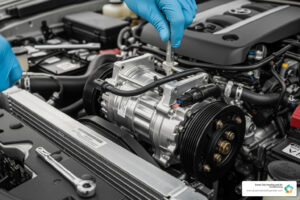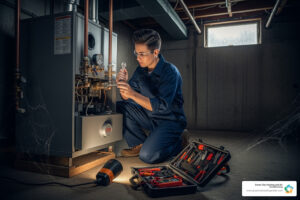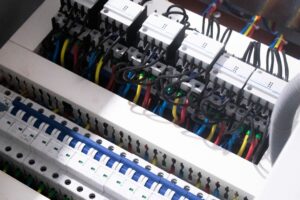Hearing a hissing or bubbling sound from your AC system in the middle of a hot summer in Auburn can be more than just annoying. These noises can signal developing issues inside your unit that may affect its efficiency or cause total failure if ignored. For homeowners depending on their cooling systems during peak temperatures, knowing what these sounds mean is a step toward better comfort and lower repair costs.
Even though strange noises don’t always mean the system is breaking down, they’re never something to overlook. Small signs like a soft hiss or a bubbling noise can indicate problems that may grow worse over time. Understanding what causes them gives you a better idea of when to take action and helps your cooling system stay reliable through the hottest weeks of the season.
Common Causes of Hissing and Bubbling Sounds
Strange sounds like hissing and bubbling can point to several different problems going on within an AC unit. Each sound has its own set of likely causes, and noticing the difference can help identify what part of your system might be struggling.
Here are some of the most common causes:
1. Refrigerant Leaks
Hissing noises can often mean refrigerant is escaping through a small crack or loose connection. This not only reduces your system’s cooling ability but can also cause long-term damage to the internal parts if left unresolved. The hissing may start off quiet and get louder as the leak expands. If your AC is failing to cool properly and you hear a clear hissing sound, refrigerant loss may be the issue.
2. Condensate Drain Issues
Bubbling sounds usually stem from the condensate drain line. If the line gets blocked, water can get backed up and make a bubbling or gurgling noise as it tries to drain. These sounds are particularly common when the system first turns on and can mean the water flow isn’t being carried away the way it should be. This can eventually lead to moisture problems or even water damage around the air handler.
3. Internal Valve Problems
Expansion valves or other internal components can also produce hissing or bubbling sounds as refrigerant moves through the system at different pressures. If something is off in this process, like irregular pressure levels or valve malfunction, it may create consistent or intermittent noise. When tracked to an exact part, this noise is often linked with uneven cooling or AC short cycling.
If you’re hearing these sounds more often or over longer periods, that’s usually a clear sign that the system needs attention. For example, one Auburn homeowner noticed their bedroom consistently felt warmer than the rest of the house. After hearing a bubbling sound from the attic where the air handler was located, it turned out the drain line had clogged, and water had started backing up into the unit. Once addressed, the cooling stabilized and the noise disappeared.
Diagnosing the Sounds
Pinpointing the source of hissing or bubbling noises can be challenging without professional tools, but there are a few simple steps homeowners can take to narrow it down before scheduling help.
Start with a basic visual check:
– Look around the indoor unit for water pooling or signs of moisture around the base.
– Check for visible ice buildup on refrigerant lines or the evaporator coil.
– Inspect your outdoor unit to make sure nothing is visibly leaking or loose.
Try to notice when the sounds happen. Do they occur when the system starts up, runs for a while, or is turning off? Keeping track of the timing and duration of the sounds can give important clues about the problem’s location and severity.
Consistent patterns like the sound returning at the same time each cycle or getting louder over several days should never be ignored. These are signs that a part of the system is under strain. To avoid guessing or worsening the issue, it’s best to have our technicians take a closer look. They carry equipment that can detect refrigerant leaks, measure pressure differences, or check drain line flow. These tools help isolate the problem and resolve it completely.
Potential Solutions to AC Hissing and Bubbling
Once the source of the noise has been identified, the next step is fixing the issue properly and completely—not just masking the sound. Most of the causes behind a hissing or bubbling AC in Auburn homes can be solved with professional service and the right tools. The key is addressing the root of the problem instead of treating it like it’s no big deal.
1. Repairing Refrigerant Leaks
If refrigerant is leaking, it’s not enough to just add more. The system needs to be tested, the damaged area sealed or replaced, and then recharged with the right amount of refrigerant. A leak left alone can drop cooling power over time and put stress on the compressor. Relieving that pressure early helps extend the life of the entire system.
2. Clearing Condensate Drains
If the bubbling sound is caused by backed-up water, flushing the drain line is often the immediate fix. That may involve applying pressure to remove the clog or, in older units, replacing a cracked or sagging line entirely. This step prevents overflow problems and stops moisture from building up around the system.
3. Fixing or Replacing Internal Valves
When hissing comes from internal valves, it usually means a part inside the system isn’t working like it should. This could be the expansion valve or another pressure-regulating part. Depending on the condition and age of the component, repair might not be possible or worth the risk of more breakdowns. In these cases, our technicians replace the faulty part with something factory-approved and make sure the refrigerant levels match manufacturer targets for proper operation.
If any of these problems are left unresolved, the system risks mechanical failure or a full shutdown, which typically costs more down the line. Immediate fixes treat the cause—not just the symptoms—and bring your system back to safe, efficient operation.
Preventative Maintenance Helps Avoid Future Noise Problems
Once your system has been repaired, the next step is keeping things from coming back. Preventing these strange sounds starts with maintaining the major parts of your AC so they don’t strain or wear out early.
Here are some ways Auburn homeowners can help minimize the chances of future issues:
– Set up a seasonal maintenance check with our professionals. We check the drain lines, valve function, and refrigerant levels before the summer hits full stride.
– Keep an eye out for early warning signs like uneven cooling, foul smells, or drips around the system. These often show up before noise does.
– Cut back any plants or debris around the outdoor unit so airflow stays consistent. Restricted airflow can overstress internal components and lead to malfunctions.
Even though a strange sound might seem small, ignoring it increases the risk of expensive damage. Treating it early and checking on your system regularly puts you in a better position to avoid heat-related breakdowns when you need cooling the most.
Ensuring Reliable AC Performance in Auburn
When hissing or bubbling sounds start coming from your AC, they’re giving you an early warning. Whether it’s a refrigerant leak, a blocked drain, or a faulty valve, these kinds of problems affect comfort, efficiency, and the life of your system. Left unaddressed, minor problems can lead to operating failure and unexpected costs.
A professional fix followed by regular maintenance keeps your system running quietly and reliably through the summer months. Knowing what those noises mean and acting on them early makes it easier to keep your Auburn home cool without interruption. By paying attention to signs your AC gives and responding with expert support, your system is more likely to keep running the way it’s supposed to even during peak cooling season.
If unusual sounds persist, let your system get the professional care it needs. At Green City Heating and Air Conditioning, our professionals recommend prompt assessment and regular checkups to keep your cooling unit performing reliably during the summer. If you notice any signs your unit isn’t running as it should, consider our AC service in Auburn. For a quick estimate or to book a service visit, please contact us today.



